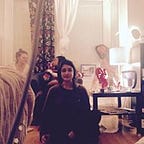72 Years
Been thinking about the use of the term “lockdown” lately. For Americans, the world that was once our oyster has suddenly become a claustrophobic place. The freedom to go anywhere and do anything is canceled for the time being. It’s unclear when our malls will re-open, if we’ll see the beach this summer, whether we’ll be able to board an international flight without clearance from a health official or special permission from a foreign government. We call this existence ‘lockdown’ and it induces individual and collective widespread anxiety, grief, and even anger. While we mostly understand and accept why we have to make concessions on some of our freedoms temporarily, we would all consider this lifestyle unacceptable — even unconstitutional — for the long-term. The ability to move, to travel, and to interact with the planet and its various cultures is what makes life rich and meaningful. It’s what makes us free.
Today marks 72 years since the Nakba, the catastrophic beginning of the systematic ethnic cleansing of Palestine that persists to this day without pause. It’s bleak to reflect on where things stand today. A fractured land and citizenry. Some blockaded into a meager strip of earth, where the Mediterranean coast represents a prison wall. Others locked into non-contiguous, ever-shrinking blobs of land, who can only dream of enjoying the shoreline. Movement beyond these confines to travel to another part of the world requires applications, sponsorships, permits, governmental letters, fingerprints, visas, and a lot of good luck. While we enter our second or third month of “lockdown,” Palestinians are in their seventh decade. Seventy-two years of being flatly denied the same basic freedoms that we have been struggling to cope without for a few months.
We have all been psychologically and emotionally — if not also financially and physically — destabilized by this pandemic. For the first time in my lifetime, we are all in a moment of extremely heightened empathy. We are more forgiving to one another, knowing that everyone is burdened by this crisis. Over night, employers developed structures that acknowledge the humanity in their workforce, healthcare workers became rightfully glorified, and the myth of productivity was squashed. We now call those once nameless workers who pick up our trash, prepare our meals, and bag our groceries “essential.” We realize now that the true definition of a hero is one who puts community above him or herself. In this moment in history, the world has become a more compassionate place.
The future is uncertain and that’s unsettling. But it is also exhilarating to watch our world shed its skin and wonder what things will look like when we emerge on the other side. There is a lot of grief to triage in this crisis. Something I have learned is that grief is easier to bear when it’s shared. In this moment of acute empathy, I have hope — perhaps naively — that in the new world we’ll do better at setting up a more compassionate way of life. I hope we look at the problems that we once considered too complex to solve with a fresh set of eyes. I hope we understand on a more personal level how psychologically violating it is to be denied basic freedoms, and apply that empathy to a child born in Gaza or a black man jogging in Georgia. I hope that maybe we’ll think differently about those who never had a “normal” to begin with, let alone return to. For those who live under lockdown not as a public health mitigation, but as a punishment for simply existing.
